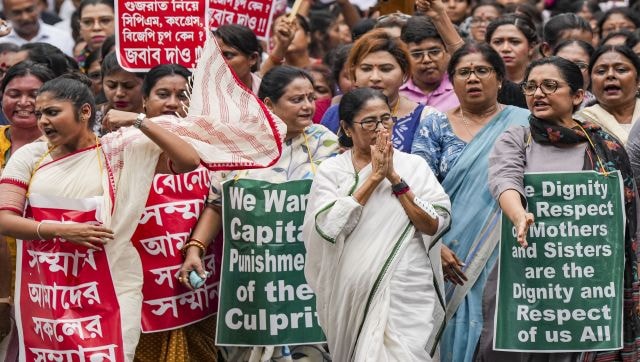Today (September 3) is a significant day for West Bengal and the Mamata Banerjee government. The West Bengal Assembly has passed the Aparajita Woman and Child (West Bengal Criminal Laws Amendment) Bill, 2024, in the State Legislative Assembly, aiming to create a “safer environment for women and children”.
Speaking in the Assembly, Chief Minister Mamata Banerjee said: “Rape is a now a national shame. Let us come together for social reform which is needed to prevent rapes.”
The anti-rape bill comes in the wake of the rape-murder of a woman medic at the state-run RG Kar Medical College and Hospital last month in the state capital, Kolkata. Following the horrific incident, massive protests emerged across the state, with many junior doctors striking work, demanding safer work conditions.
What exactly is the legislation? What are its provisions? Can states actually draft such legislation?
What is the Aparajita Bill?
Following the heinous
rape and murder of a trainee doctor at RG Kar Medical College and Hospital on August 9, Chief Minister Mamata Banerjee declared that she would introduce stringent laws against rape in the state. In her announcement, she had also said that the Governor would have to sign the Bill or the state would see a bigger uprising.
The result of this is the ‘
Aparajita Woman and Child Bill, (West Bengal Criminal Laws and Amendment) Bill 2024’, which was approved by the Bengal Cabinet. The draft bill proposes to amend the newly passed
Bharatiya Nyay Sanhita 2023, Bharatiya Nagarik Suraksha Sanhita, 2023 laws and the Protection of Children from Sexual Offences Act 2012 “in their application to the state of West Bengal to enhance punishment and to constitute the framework for expeditious investigation and trial of the heinous act of violence against women and children”.
In its statement of purpose, the legislation proposes “to create a safer environment for women and children” in the state. “It is a testament to the State’s unwavering commitment to uphold the fundamental rights of its citizens, particularly women and children, and to ensure that heinous acts of rape and sexual offences against children are met with the full force of the law,” the draft Bill states.
What are the provisions of the Bill?
The legislation proposes capital punishment for persons convicted of rape if their actions result in the victim’s death or cause her to become vegetative. Moreover, the draft states that persons convicted of rape and gang rape would receive a life sentence lasting for the rest of their natural lives.
“The state government of West Bengal perceives the egregious act of rape of women and sexual offences against children, regardless of their age, as the utmost violation of their dignity, irrespective of the status of the perpetrator vis-a-vis the victim of the condition of the victim caused by such rape of the woman and sexual offence against the child,” the draft states.
The legislation also stipulates that a victim’s medical expenses will be determined by the special rape court that will try the case, and borne by the convict or their family. If they fail to pay up, the amount will be recovered through legal means.
The Aparajita Bill also includes a provision about time-bound investigation in rape cases. It stipulates that probes into rape cases must be completed within 21 days of the initial report, a reduction from the previous two-month deadline.
Furthermore, as per the Aparajita Bill, repeat offenders would be “imprisoned for life”, meaning they would be kept behind bars for the remainder of their natural life. The proposed legislation also seeks to penalise printing or publishing of any matter relating to court proceedings without permission with a punishment of “imprisonment of three to five years and fine”.
Can states make amendments to national laws?
The tabling of the Aparajita Bill in the Bengal Assembly has raised the question as to whether a state government can tweak central laws.
Constitutional experts have noted that the states can do this under Article 254(2) of the Constitution. However, the law will need the assent of the President. Article 254(2) permits a state legislature to pass a law that contradicts a central law on a matter in the concurrent list, but only if the state law receives presidential assent. This means that the state law will prevail in that state, even if it is different from the central law as long as it has been approved by the President.
Supreme Court lawyer Sanjay Ghose told India Today that as criminal law is on the concurrent list, the state government can make amendments. He stated that the West Bengal government can pass its own state amendment and send it to the President, which is well within the Constitutional limits. “If the President gives her assent to the state amendment, as that state is concerned, in this case, West Bengal will prevail,” he added.
However, it is important to note here that the President is not compelled to give his/her assent. “The President goes by the advice of the central government. He or she is under no obligation to give consent. Also, there is no time limitation provided in the Constitution within which period this process has to be undertaken by the central government,” Ghose was quoted as telling India Today.
Notably, West Bengal isn’t the first state trying to tweak central laws. In 2019, following the brutal rape and murder of a veterinarian, the Andhra Pradesh government passed the Disha Bill, making rape and gang rape punishable by death. The following year, 2020, also saw Maharashtra passing the Shakti Criminal Laws Bill, 2020, which saw the levying of the death penalty for rape.
However, both these bills are yet to receive a nod from the president.
With inputs from agencies
Link to article –
West Bengal’s Aparajita Bill seeks death for rapists. But can states make their own criminal laws?
